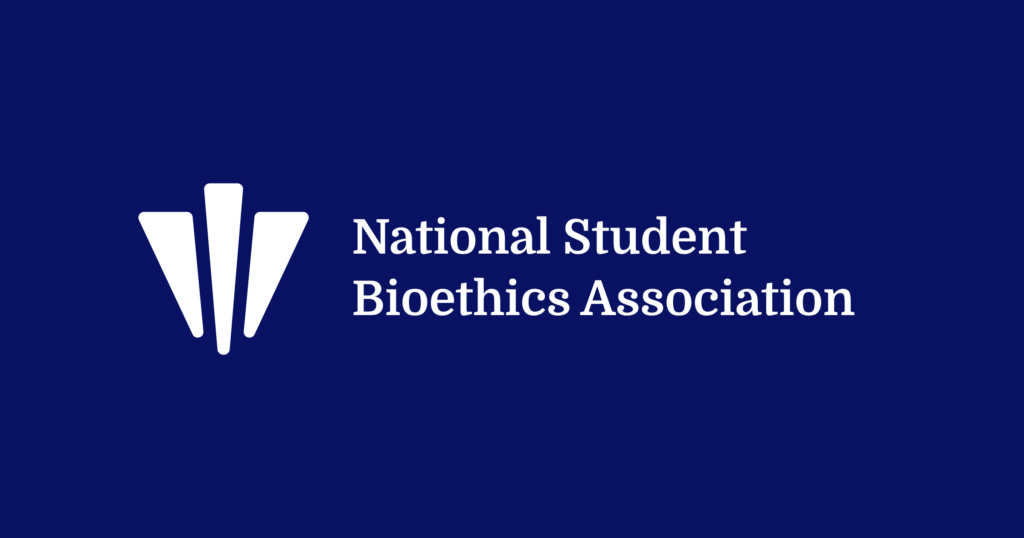The National Student Bioethics Association (NSBA) was founded in 2021 as a not-for-profit initiative that aims to bridge gaps in access to bioethics programs, resources, discourse, and professional connections for interested students across the country.

Our goals at NSBA are to:
- foster discussion of ethical issues in medicine and biomedical research
- provide resources to equip students with knowledge and opportunities to grow as individuals
- enhance each student’s ability to think through contemporary ethical issues
- promote ethical decision-making and bioethics education
A Conference for Bioethics Students
On May 21st, 2022, NSBA will host its inaugural conference, designed by and for students. The conference provides space for students, the next generation of bioethics scholars, to present their work in a supportive peer environment. Students are invited to attend virtually, regardless of their age and/or academic standing. Students from high school through graduate school are welcome. We recognize the rich student perspectives, spanning different disciplines, ages, sociocultural backgrounds, and political ideologies.
Conferences usually target mid- or late-career practitioners. While students have been largely engaged in research, they are seldom provided with opportunities to network and present their work in professional settings. However, as the world has reckoned with the COVID-19 pandemic, political divisiveness, and global conflict, students like us have emerged with novel ideas and contributions to many fields, including bioethics. Therefore, it is critical that we listen to and nurture student voices.
Students Face Barriers
The experience of presenting at national bioethics conferences has historically been difficult for students to access. Many students face prohibitive barriers, such as cost of conference registration and travel fees, time limitations given by ongoing academic studies, and a lack of support from or connections to mentors in bioethics. The opportunity to present at a conference is invaluable for the next generation – it elevates students and early-career professionals by providing a platform to sharpen their research and communication skills and learn from colleagues across different disciplines.
NSBA Conference is Free to Students
Importantly, the NSBA inaugural conference is free to all students presenting and attending. Our hope is for everyone to come away with more exposure to the breadth of different topics that fall within the bioethics domain. Philosophy and ethics are rarely part of high school, undergraduate, or graduate curricula despite both being critical lenses through which we can examine issues in STEM education. Educating medical trainees in particular will help infuse clinical practice with key ethical perspectives. Beyond medical practice, philosophy and ethics are critical tools for addressing public health responses, clinical research, biotechnology, and healthcare law. Furthermore, the integration of humanities in such practices can foster effective communication and collaborative problem solving.
Building Ethical Leadership Early
The next generation of ethical leaders begins with a strong foundation in moral reasoning and problem solving. The conference promotes an interdisciplinary educational foundation for a diverse group of budding health professionals. Such a foundation will arm students with the perspectives necessary to innovate and provide clinical care in a way that addresses contemporary ethical issues. It will prepare students to engage in bioethical discourse. It will make us better leaders. Early exposure to the bioethics community will encourage future professionals to actively pursue these interdisciplinary topics in research and practice as well as expand students’ professional networks.
Democratizing the field of bioethics to include and welcome students is crucial to amplifying a diverse range of voices. Students can share perspectives grounded in their individual life experiences that are valuable contributions to the field. A more inclusive bioethics field will become more reflective of the populations it aims to serve.
Students can register for the free inaugural NSBA conference at this link.
The authors:
David Kulp, BA – Emory University School of Medicine, University of St Andrews; Maya Roytman – Loyola University Chicago; Nell Mermin-Bunnell, BS – Emory University School of Medicine; Alexa Guarente – Brown University; Rohin Bhatt, BSc, LLB (Hons) – Center for Bioethics, Harvard Medical School; Shawn Kaura, MBE – Lake Erie College of Osteopathic Medicine; Cara Hunt, MA – Division of Medical Ethics, NYU Grossman School of Medicine; Jada Wiggleton-Little, BA – Department of Philosophy, University of California, San Diego; Ariadne Nichol, BA – University of California, San Diego School of Medicine and the Stanford Center for Biomedical Ethics, Stanford University School of Medicine